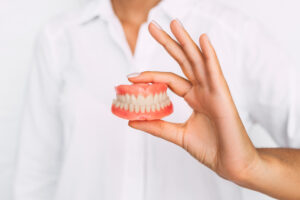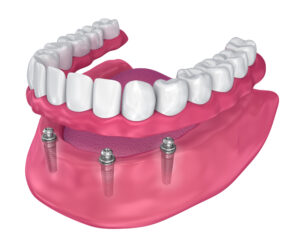How Many Dental Implants are Necessary to Secure Implant Dentures?

Dentures have helped people replace missing teeth for hundreds of years. They can improve the cosmetics of a smile and enable someone missing all of his or her teeth to chew food adequately. Traditional dentures do not use any type of anchorage in the jaws, so they pose some challenges with retention
Recent advances in dental implants have addressed those challenges very successfully. When we use dental implants to provide anchorage for a denture, patients are able to chew, speak, and laugh without fear of the denture dislodging and causing embarrassment.
How Do Implants Secure Dentures?
Dental implants are small root replacements that your dentist surgically inserts into the jawbone where the teeth used to be. Then we attach small connectors to the implant roots that project out of the gums. The dentures contain receivers for those connectors on their interior surface. When the patient inserts the denture into the mouth, it snaps onto the implant connectors, creating very solid attachment.
This connection is secure, but easily removable. Patients who use dental implants to secure their dentures continue to remove the denture nightly for cleaning. The best analogy to describe this connection is like the connection on a snap front shirt. The snaps hold the shirt closed under normal wear, but you can easily unsnap the buttons with increased pressure in the opposite direction. The same is true for implant denture connections. You simply lift the denture away from the implants, and the connection easily disconnects.
What are the Advantages of Implant-Supported Dentures?
 Implant-supported dentures have several important advantages over traditional dentures. Most of these advantages stem from the secure connection between the denture and the implants. Others are the result of the implants’ presence in the jawbone.
Implant-supported dentures have several important advantages over traditional dentures. Most of these advantages stem from the secure connection between the denture and the implants. Others are the result of the implants’ presence in the jawbone.
- No Movement of the Denture when Eating, Speaking or Laughing – One of the most common complaints we hear from our patients who wear traditional dentures is looseness. A loose denture can cause major embarrassment during social functions. It can simply fall out of the mouth during eating, speaking or laughing. Unfortunately, this causes some people to avoid social interactions. With implant-supported dentures, the denture has an anchor in the bone and a secure attachment to that anchor. Looseness is no longer a problem, so people can enjoy life to the fullest!
- Fewer Sore Spots – The removal of looseness also removes much of the friction that denture wearers experience between the acrylic denture base and the gums. As loose dentures move around on the gums, they can create sore spots and blisters, just like a shoe that is slightly too big. With a secure attachment to implants, the denture does not move around as much, so patients will have fewer sore spots on the gums.
- Improved Chewing Force – Traditional dentures produce a relatively weak chewing force. By anchoring the denture to implants, patients are able to distribute the force down into the jawbone, which is where chewing force from natural teeth originates. This allows for better chewing with more force to grind the food effectively.
- Maintenance of the Jawbone – Dental implants actually stimulate the health of the jawbones where they reside. The jawbone’s sole purpose is to hold teeth. When teeth are no longer present, the jawbone slowly shrinks and withers away. This makes dentures even more challenging (they need a healthy, thick ridge of jawbone for good support). Dental implants actually “trick” the bone into thinking teeth are present, so the bone does not shrink in that specific area. Some people actually opt for dental implants for this reason alone. They will have implants placed into the bone without using any attachments because the goal is just bone maintenance.
What are the Disadvantages of Implant-Supported Dentures?
We know. They sound pretty great, right? There are a few disadvantages, though, which means implants aren’t the best option for everyone in dentures.
- Increased Cost – Implants are not cheap. By adding dental implants to your treatment of dentures, the cost increases by at least two to three times. Of course, the increased cost provides those great benefits we just described in the previous section. The cost typically depends on the number of implants, which makes it a factor in your answer to the question of the next section.
- Surgery Required – The placement of dental implants is a surgical procedure. Some people do not want to have oral surgery, and others, due to certain medical complications or risk factors, are not candidates for elective surgery. The procedure is minimally invasive and relatively quick. The risk for pain during the surgery is low, and many people opt for sedation so they don’t remember the procedure itself.
- Risk for Implant Failure – Implants can fail. By “fail”, we mean that they do not attach to the surrounding jawbone, and therefore, do not provide the anchorage we need. Certain factors increase the risk for failure, including tobacco use and diabetes. Patients who have taken a medication classified as a proton pump inhibitor also have a higher risk for implant failure. Ann is an expert in dental implants, and she will assess your unique situation to determine your personal risk for implant failure.
How Many Dental Implants Should I Get to Support my Dentures?
 When deciding how many dental implants you should get to support a full denture, you will have a thorough evaluation with imaging and a conversation with your doctor about the treatment plan. Working together, you can determine the best option for your mouth. Your doctor will tell you how many implants your jawbone can support. If you have already suffered a loss of jawbone from years of missing teeth, you may have limitations on how many implants your mouth can hold.
When deciding how many dental implants you should get to support a full denture, you will have a thorough evaluation with imaging and a conversation with your doctor about the treatment plan. Working together, you can determine the best option for your mouth. Your doctor will tell you how many implants your jawbone can support. If you have already suffered a loss of jawbone from years of missing teeth, you may have limitations on how many implants your mouth can hold.
Minimum of Two
In general, we must have relative symmetry from the implants in order to provide balanced support from left to right. We commonly place two dental implants in the lower jawbone. Those two implants sometimes form a line that can act as a fulcrum along which the denture can slightly shift and flex, so the stability is better than a traditional denture, but not the best.
Four to Six are Optimal
With four to six implants in a dental arch, the denture will have great stability and a small “cushion” in the event you suffer an implant failure. Obviously, if you only have two implants and one fails, you are in an unfortunate situation. If you have six and one fails, you still have great support for your denture.
More Questions about Dental Implants and Dentures?
Call Designer Smiles today to schedule an implant consultation with Dr. Ann. She can answer any question you have about implant-supported dentures and assess your specific situation. She will help you make treatment decisions that will help you meet your goals and achieve long-term dental health!
